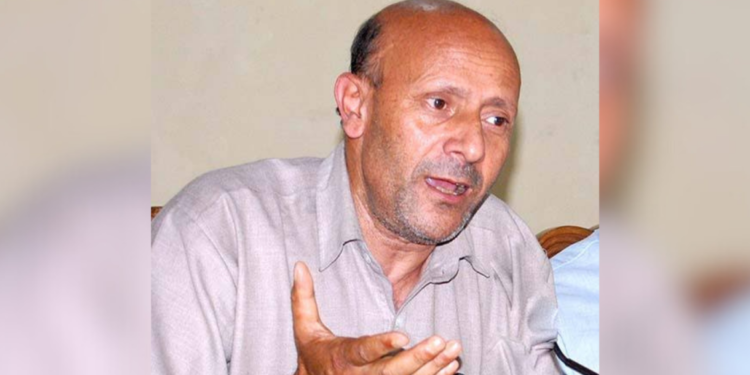Srinagar: The meteoric rise of Engineer Rashid’s Awami Ittehad Party (AIP) has deepened political uncertainty in Jammu and Kashmir amid speculations that the controversial politician could emerge as a potential kingmaker in the upcoming assembly election.
Rashid’s fortune has shone through at a time when the Bharatiya Janata Party’s (BJP’s) allies in Kashmir appear to be struggling to expand their political appeal after suffering spectacular setbacks in the 2024 Lok Sabha elections.
Despite enjoying the Union government’s patronage, the J&K Apni Party, led by Altaf Bukhari, put up a forgettable show with its only prominent candidate and former J&K minister, Ashraf Mir, losing his security deposit after securing less than 10% vote share in the Srinagar Lok Sabha constituency.
Sajad Lone’s party, the Jammu and Kashmir’s People’s Conference (JKPC), also seems to be struggling to hold its ground. The party’s vote share in Baramulla Lok Sabha constituency went down from about 22.65% in the 2019 election, when it fielded Raja Aijaz Ali, to 16.75% in the recent election when Lone himself was in the fray.
To maintain its grip on J&K, the BJP recently curtailed the powers of any elected government in the erstwhile state through a recent gazette notification that expanded the powers of the Union territory’s lieutenant governor – a Union government appointee.
But with its Jammu unit in disarray and the voting behaviour of the electorate in Kashmir witnessing a groundbreaking shift towards Rashid’s idea of democracy, the saffron party could find it difficult to crack J&K’s electoral arithmetic. The National Conference-Congress alliance is widely believed to emerge as the single largest bloc in the elections, but it too may fall short of a comfortable majority.
Against this backdrop, speculations are rife that the BJP is extending an olive branch to the AIP leader and treating him with kid gloves after his spectacular victory in Lok Sabha polls in which he defeated former J&K chief minister Omar Abdullah.
Rashid got permission from the National Investigation Agency (NIA), which arrested him in 2019 on terror funding charges, to take oath as a member of the Lok Sabha.
In a contradictory move, Sarjan Barkati, a popular religious figure who rallied masses at the peak of unrest in Kashmir in 2016, was squeezed out of the upcoming electoral contest after the Election Commission rejected his nomination papers for Zainapora assembly constituency of Shopian in South Kashmir.
Both Rashid and Barkati have been booked under the provisions of the stringent Unlawful Activities Prevention Act (UAPA) and face serious charges of financing terrorism in J&K. Rashid has also faced allegations of “misusing” the phone facility in the Tihar jail, according to a disclosure made by the NIA at a Delhi court on Wednesday (August) 28.
Meanwhile, AIP’s ranks have swelled in recent weeks, with the son of a former Hurriyat Conference secretary and JKPC leader, among a motley group of lower- and middle-rung political activists and workers from the National Conference (NC) and People’s Democratic Party (PDP, joining Rashid’s party.
In this scenario, Rashid, who led in 18 out of 21 assembly segments of Baramulla Lok Sabha constituency, could well emerge as a kingmaker, if not the king himself. With some members of Jamaat-e-Islami also entering the electoral fray, analysts believe that the emerging political developments will further fracture the mandate in Kashmir which suits the BJP.
“Rashid’s party is playing the same role as the PDP which appeared on J&K’s political horizon in late 1990s and went on to form a coalition government with the Congress in its electoral debut in the assembly election. Whether the AIP succeeds in maintaining its grip on the electorate and how far, if at all, the centre is willing to concede the ground remains to be seen,” said a Srinagar-based political analyst, who didn’t want to be named.
These speculations were also spotlighted in a recent interview of Rashid’s star campaigner and son, Abrar Rashid, who, without taking names, lashed out at the “regional parties” for “building palaces out of the blood spilled by Kashmiri youth”, even though he steered clear from commenting on the prevailing political uncertainty and his father’s prolonged incarceration in Tihar jail.
“They (regional parties) are afraid that if Rashid walks out of jail, their political careers will be finished. To save themselves, they are accusing him of being a separatist. My father is pro-people and pro-nation, and its biggest proof is that he contested election under the ambit of Indian Constitution,” Abrar said, adding that the charges of terror funding against his father were “politically motivated”.
While Rashid has taken on the security establishment over human rights problems in Kashmir – including the issue of bonded labour previously practised by the army in some pockets of north Kashmir of which he has been a victim himself – the AIP leader and former junior engineer in J&K’s power department has in the past faced allegations that he was the establishment’s loose cannon nurtured to keep the regional parties in check.
Whether Rashid will have a role in the assembly elections and how he will play it, once the results of the J&K assembly elections are out on October 4, remains to be seen.





















